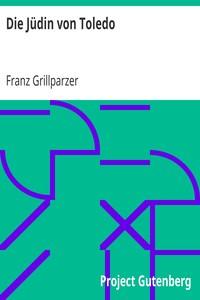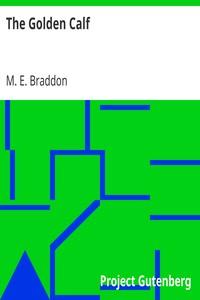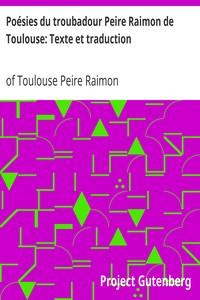Read this ebook for free! No credit card needed, absolutely nothing to pay.
Words: 94153 in 59 pages
This is an ebook sharing website. You can read the uploaded ebooks for free here. No credit cards needed, nothing to pay. If you want to own a digital copy of the ebook, or want to read offline with your favorite ebook-reader, then you can choose to buy and download the ebook.
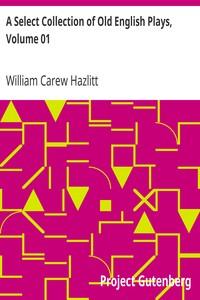

: A Select Collection of Old English Plays Volume 01 by Dodsley Robert Compiler Hazlitt William Carew Editor - English drama
Preface Interlude of the Four Elements Calisto and Melibaea Everyman: a Moral Play Hickscorner The Pardoner and the Friar The World and the Child God's Promises The Four P.P. A New Interlude, called Thersites Footnotes
PREFACE
It is desirable that it should be seen precisely in what manner, and to what extent, the edition now offered differs from its predecessors as regards the contents. The points of variation are three: 1. Omissions; 2. Additions of pieces not included in the former editions; 3. Additional plays now first reprinted from the originals. The first division comprises the following productions which, since the last republication of Dodsley, have been taken up into the collected editions of their respective authors:--
The second and third characteristics of our book are the ADDITIONS, which, as we have stated, are of two kinds. In the first place, we may enumerate the dramas new to Dodsley's collection, though previously edited in a variety of forms:
"The Lost Lady," by Sir William Berkley or Barkley; "The Marriage Night," by Lord Falkland; "The Shepherd's Holiday," by Joseph Butter; "Andromana," by J.S., and "All Mistaken, or the Mad Couple," which were given by Dodsley in 1744, but were omitted in the second and third impressions, have been restored to their places.
The remaining feature, recommending the undertaking to indulgent notice, is perhaps the most important and interesting. Subjoined is a list of the dramatic compositions which have never hitherto appeared in any series of Old English Plays, and of which the originals are of the utmost rarity:--
A strictly chronological arrangement has been adopted. Such a plan appeared to be the most desirable and the most obvious, as it facilitates our appreciation of the gradual and progressive development of dramatic composition. If it may be thought to labour under any disadvantage, it is perhaps that it has the effect of throwing into a single consecutive series, without discrimination, pieces which are mere interludes, and others which are characterised by higher qualities, and aspire to belong to the regular drama. But the evil will be found not to be of a very serious kind, and it will disappear after the earlier volumes of the collection.
The first and second editions of Dodsley's collection appear, notwithstanding what is asserted to the contrary in Reed's preface, to have been superintended with no very high degree of care, and the late Mr Dyce, indeed, used to observe that the same criticism was applicable to the edition of 1825. But the latter, with the fullest admission of its defects, is certainly marked by great improvements on its predecessors in more than one way. The labours of Hawkins and Dilke reflect considerable honour upon those gentlemen.
It is almost superfluous to observe that the preceding editions, the last and best not excepted, present a very large number of statements, opinions, and readings, which more recent and more exact information has shown to be erroneous. All these mistakes have been carefully rectified, wherever the knowledge and experience of the editor enabled him to detect them.
A certain number of corruptions and obscurities remain, which it passed the editor's ingenuity to eradicate or clear away. The printed remains of our early drama have come down to us, for the most part, in a sadly mutilated state, and the attempt to amend and restore the text to its original purity will, it may be safely affirmed, never succeed more than to a very imperfect extent. Even the late Mr Dyce's revised edition of Shakespeare, 1868, abounds with misprints and other distortions of the writer's sense; and we must abandon in some cases the hope of ever arriving at the true readings. So it is with the miscellaneous assemblage of dramatic productions here brought together. A great deal has been done by a succession of editors to reduce the errors of the printer or copyist to a minimum; but, after all, there are places where it would require the assistance of the Sphinx to supply a chasm, or rectify a palpable mistake.
The work, in its present state, should assuredly have some degree of interest and worth; for it offers in one collected body the best specimens of dramatic literature which the English language affords, castigated and enriched by some of our best commentators and critics.
It is proposed to introduce in the concluding volume two indexes, one of names and another of subjects, as the want of a ready means of reference to passages, phrases, and characters in these old plays, is one which the editor himself has so strongly felt as to make him desirous of removing it, so far as possible, for his own sake and that of the public.
Free books android app tbrJar TBR JAR Read Free books online gutenberg
More posts by @FreeBooks

: König Ottokars Glück und Ende Trauerspiel in fünf Aufzügen by Grillparzer Franz - Bohemia (Czech Republic) Drama; Ottokar II King of Bohemia 1230?-1278 Drama DE Drama
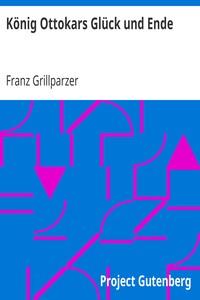

: Die Jüdin von Toledo Historisches Trauerspiel in fünf Aufzügen by Grillparzer Franz - Man-woman relationships Drama; Alfonso VIII King of Castile 1155-1214 Drama; Jews Spain Castile Drama; Kings and rulers Drama DE Drama
